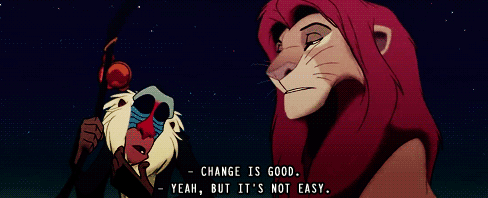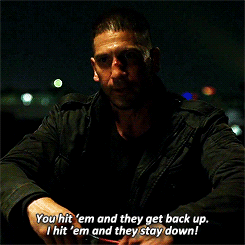Daredevil vs. Punisher: Means and Ends is basically a story about Punisher fighting himself. He is struggling with his demons and tries to fix himself through what he calls justice. During the first three issues, we experience Punisher struggle to maintain his control. He had to keep reminding himself to stay focus and forget about all the stuff that might jeopardize the mission. When he meets Mary, he can no longer stay focus. Once he sees Mary’s face he can no longer suppress the memories.
Of course what he is doing is not ethical. Killing people, even if they are scum, is still bad. Last class we discussed how Rick from
The Walking Dead went from “You kill? You die” to “You kill--you live.” He did it out of necessity, he needed to commit those horrible acts in order to survive. In Bishop’s article there is a quote from Rick to Carl “I do things… a lot of bad things, to help you, to help you and all the other people in our group… That’s the world we live in now… but Carl, you need to never forget… when we do this things and we’re good people… they’re still bad things… You can never lose sight of that. If these things start becoming easy that’s when it’s all over. That’s when we become bad people.” (Bishop 83). There is no doubt that Rick is a good guy, we sympathize with him and we understand why he is doing it. We may even admire his courage and his dedication to his family.

Punisher on the other hand, he is a bit hard to sympathize with because he is not doing it out of survival. I don’t even think he is doing it just to protect the city and bring justice. He has selfish reasons. He is trying to fill the gap his family left. He is trying to bring justice for his own family.
Punisher is trying to release the pain and anger in him. He may not want to admit it, but he enjoys the killing. I think it scares him how much he likes it. It feels good to kill the bad guys. Does that make him a bad person? No it does not. It is very easy for him to kill them because he has a reason. Those criminals have lost all humanity according to Punisher. He is not going around killing people, he is killing monsters. He is killing people who deserve to be killed. He is in control about who he kills. If he loses control, tragedy will strike like it did here:
He starts firing… he is trying to control it… and then…
He lost it. Look at his face. Imagine all that pain being released from his body. Imagine how he must feel after all this time suppressing everything. Imagine how good it feels to pull that trigger and let those bullets flow. Imagine how it feels to lose control. But of course, that comes with a price.


Now look at his face. Look at his pain. He knows why he has been hiding this side. He knows why he cannot let go. Imagine how horrible it feels to pull that trigger and let a bullet hit an innocent man. Punisher did not enjoy that and it was not easy for him. He hated himself for shooting an innocent man. He sees himself becoming the type of person he hates. That is why he is not a bad guy. He is just a man who does bad things. Punisher is complex. He is not a bad guy, but I cannot say that he is a good guy. All I can say is that I sympathize with him, but I know that he will not be able to control himself forever. Eventually and unfortunately, he will be a bad guy. He will never be satisfied and he may not care about who he kills.
Sources:
Bishop, Kyle W. “Battling Monsters and Becoming Monstrous: Human Devolution in The Walking Dead." Ed. Marina Levina and Diem-My T. Bui. Monster Culture in the 21st Century: A Reader. New York: Bloomsbury Academic, an Imprint of Bloomsbury Plc, 2013. 73-85. Print.















